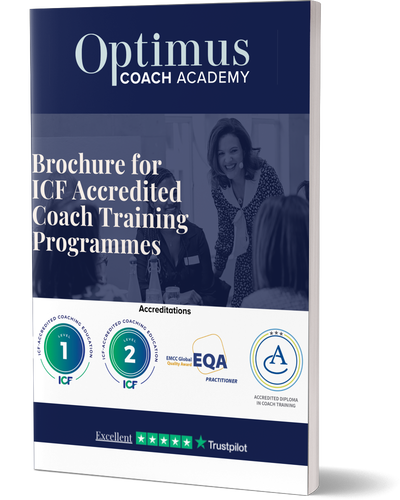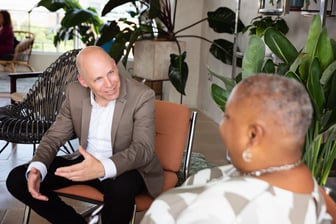Exploring The Client's Identity
Understanding your client's identity is crucial in coaching because their sense of self shapes how they perceive their world, make decisions, and engage with their goals. Identity encompasses: personal values, cultural background, life experiences, roles, and beliefs, all of which influence behaviour, mindset, and aspirations. By understanding these elements, you can better tailor your coaching approach to resonate with the client and create meaningful, transformative change. This is where you explore more of the who of coaching.
When you're working more deeply with clients the coaching work you do is often about identity change as you support your clients to build their self awareness of who they are and consider who they want to become.
A client’s identity changes over time and plays a significant role in shaping how they perceive themselves and how they relate to the world around them. Equally, as a coach self awareness is key this is why we take you through the course so you can do your own work to really know yourself and step into your own future identity as a confident and credible coach.
Identity can be shaped by various elements such as cultural background, ethnicity, nationality, gender, personal experiences, beliefs, values, social interactions, affiliations, social roles, networks, communities, etc being aware of the influences of context on a clients identity and being open and non judgemental is key as a coach.
How does this look?
- Through the coaching process you may unearth deep seated beliefs which the client holds about themselves and help them to build new beliefs using neuroplasticity. . For many clients belief and identity change underpin behaviour change.
- Visualisation and future self work can be a powerful way of helping your clients connect with who they want to be and can support state change allowing clients to be more solution focused and make better decisions by working with specific areas of the brain
- Exploring identity can help a client to build their own self awareness and recognise what they need so they can find solutions which work for them
- When a client is struggling to make progress there can often be other things going on exploring "what else is going on" can often uncover unmet needs or values conflict
- Strengths based approaches can support clients to build their inner confidence, these approaches can be incredibly powerful for neurodivergent clients
- For coaches, understanding that individuals may have internal conflict between different elements of their identity and who they are is core as through coaching we can help our clients to consider what is most important and what they want to explore more.
- As a coach knowing who you are and being secure in your own identity means you can be more present with your clients and explore more effectively through their lens
We explore our own identity as coaches and our clients identity throughout the courses: in the associate course we go deeper into this in Module 3, 4, 5 and 7. In the professional course in Modules 3, 4, 6 & 8.
Are you wondering how this can show up in a coaching session? We share some examples below which can give you clarity on how you can apply this concept to real life coaching scenarios.
Why It’s Important: A client’s identity is deeply connected to their values—what matters most to them. When goals align with their core values, clients are more motivated, committed, and empowered to achieve them.
Example: Imagine a client who is a parent and their family is a central part of their life. If their goal is to advance in their career, but this goal conflicts with their desire to spend more time with their children, they may feel torn and unmotivated. The coach could say, “How does your desire to spend time with your children impact your choice of career" This question can help them to open up their thinking about what they need in terms of their new role. You could further explore what their perfect role would be and what would be essential and what desirable. As a coach your role is to support the client to consider what success would look like given where they are in their life.Why It’s Important: Understanding your client’s identity enables you to identify their natural strengths, resources, and skills, allowing you to empower them in a way that is authentic to who they are. Strengths-based coaching helps the client leverage their existing assets to move forward with confidence and success.
Example: A client might identify strongly as a creative thinker but feel frustrated in a job that requires analytical skills. By acknowledging this aspect of their identity, the coach can encourage the client to use their creativity to solve problems in their work or explore new career opportunities that align with their creative strengths. The coach might say, “You’ve always been a creative problem solver how can you use this in your current role?" or "How could you approach your role with more creativity?" or "What does creative thinking look like to you?" What you're doing is exploring the lens of creativity with your client and helping them to consider where / if they can use this strength in their current context.
Why It's important: Our belief structures underpin our behaviour. Often we don't take action as we're stuck in a space of self doubt or lack of confidence. Supporting clients to change beliefs and their self identity helps them to change their behaviour and achieve their goals.
Example: A client comes to you as they really want to step into a leadership role however they don't see themselves as a confident leader. They are stuck in a cycle of self doubt. You can support your client to consider who they would be if they were this leader and identify the beliefs and thoughts they would have. Through coaching you help the client consider how they can start to act in accordance with this new identity building new neural pathways in their brain and new belief structures. You might ask questions like "If you were a confident leader, what would you believe about yourself" or "What does confidence look like to you?" or "Who do you feel embodies confident leadership?" these questions are designed to evoke awareness and support new insights.
Click on the buttons below to understand the importance of the other pillars we teach within our Optimus Holistic Coaching Framework.
Download Our Latest Brochure To Find Out How We Integrate Our Holistic Coaching Approach In Our Triple Accredited Diplomas

-
You'll understand more about the diploma courses and what we offer
-
Find out course dates and meet members of the Optimus team
-
A detailed breakdown of the diploma modules taught on our accredited diplomas

Are you interested in training to be an accredited coach ?

Are you in a leadership role looking to develop coaching skills?

Are you an existing coach looking for formal certification?
